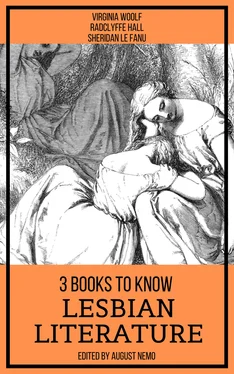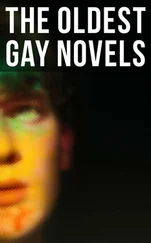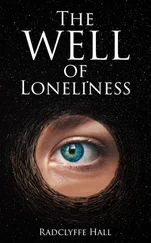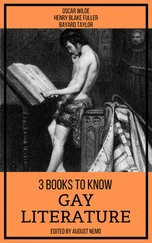And so they would go on talking or rather, understanding, which has become the main art of speech in an age when words are growing daily so scanty in comparison with ideas that 'the biscuits ran out' has to stand for kissing a negress in the dark when one has just read Bishop Berkeley's philosophy for the tenth time. (And from this it follows that only the most profound masters of style can tell the truth, and when one meets a simple one-syllable writer, one may conclude, without any doubt at all, that the poor man is lying.)
So they would talk; and then, when her feet were fairly covered with spotted autumn leaves, Orlando would rise and stroll away into the heart of the woods in solitude, leaving Bonthrop sitting there among the snail shells, making models of Cape Horn. 'Bonthrop,' she would say, 'I'm off,' and when she called him by his second name, 'Bonthrop', it should signify to the reader that she was in a solitary mood, felt them both as specks on a desert, was desirous only of meeting death by herself, for people die daily, die at dinner tables, or like this, out of doors in the autumn woods; and with the bonfires blazing and Lady Palmerston or Lady Derby asking her out every night to dinner, the desire for death would overcome her, and so saying 'Bonthrop', she said in effect, 'I'm dead', and pushed her way as a spirit might through the spectre-pale beech trees, and so oared herself deep into solitude as if the little flicker of noise and movement were over and she were free now to take her way—all of which the reader should hear in her voice when she said 'Bonthrop,' and should also add, the better to illumine the word, that for him too the same word signified, mystically, separation and isolation and the disembodied pacing the deck of his brig in unfathomable seas.
After some hours of death, suddenly a jay shrieked 'Shelmerdine', and stooping, she picked up one of those autumn crocuses which to some people signify that very word, and put it with the jay's feather that came tumbling blue through the beech woods, in her breast. Then she called 'Shelmerdine' and the word went shooting this way and that way through the woods and struck him where he sat, making models out of snail shells in the grass. He saw her, and heard her coming to him with the crocus and the jay's feather in her breast, and cried 'Orlando', which meant (and it must be remembered that when bright colours like blue and yellow mix themselves in our eyes, some of it rubs off on our thoughts) first the bowing and swaying of bracken as if something were breaking through; which proved to be a ship in full sail, heaving and tossing a little dreamily, rather as if she had a whole year of summer days to make her voyage in; and so the ship bears down, heaving this way, heaving that way, nobly, indolently, and rides over the crest of this wave and sinks into the hollow of that one, and so, suddenly stands over you (who are in a little cockle shell of a boat, looking up at her) with all her sails quivering, and then, behold, they drop all of a heap on deck—as Orlando dropped now into the grass beside him.
Eight or nine days had been spent thus, but on the tenth, which was the 26th of October, Orlando was lying in the bracken, while Shelmerdine recited Shelley (whose entire works he had by heart), when a leaf which had started to fall slowly enough from a treetop whipped briskly across Orlando's foot. A second leaf followed and then a third. Orlando shivered and turned pale. It was the wind. Shelmerdine—but it would be more proper now to call him Bonthrop—leapt to his feet.
'The wind!' he cried.
Together they ran through the woods, the wind plastering them with leaves as they ran, to the great court and through it and the little courts, frightened servants leaving their brooms and their saucepans to follow after till they reached the Chapel, and there a scattering of lights was lit as fast as could be, one knocking over this bench, another snuffing out that taper. Bells were rung. People were summoned. At length there was Mr Dupper catching at the ends of his white tie and asking where was the prayer book. And they thrust Queen Mary's prayer book in his hands and he searched, hastily fluttering the pages, and said, 'Marmaduke Bonthrop Shelmerdine, and Lady Orlando, kneel down'; and they knelt down, and now they were bright and now they were dark as the light and shadow came flying helter-skelter through the painted windows; and among the banging of innumerable doors and a sound like brass pots beating, the organ sounded, its growl coming loud and faint alternately, and Mr Dupper, who was grown a very old man, tried now to raise his voice above the uproar and could not be heard and then all was quiet for a moment, and one word—it might be 'the jaws of death'—rang out clear, while all the estate servants kept pressing in with rakes and whips still in their hands to listen, and some sang loud and others prayed, and now a bird was dashed against the pane, and now there was a clap of thunder, so that no one heard the word Obey spoken or saw, except as a golden flash, the ring pass from hand to hand. All was movement and confusion. And up they rose with the organ booming and the lightning playing and the rain pouring, and the Lady Orlando, with her ring on her finger, went out into the court in her thin dress and held the swinging stirrup, for the horse was bitted and bridled and the foam was still on his flank, for her husband to mount, which he did with one bound, and the horse leapt forward and Orlando, standing there, cried out Marmaduke Bonthrop Shelmerdine! and he answered her Orlando! and the words went dashing and circling like wild hawks together among the belfries and higher and higher, further and further, faster and faster they circled, till they crashed and fell in a shower of fragments to the ground; and she went in.
––––––––

Orlando went indoors. It was completely still. It was very silent. There was the ink pot: there was the pen; there was the manuscript of her poem, broken off in the middle of a tribute to eternity. She had been about to say, when Basket and Bartholomew interrupted with the tea things, nothing changes. And then, in the space of three seconds and a half, everything had changed—she had broken her ankle, fallen in love, married Shelmerdine.
There was the wedding ring on her finger to prove it. It was true that she had put it there herself before she met Shelmerdine, but that had proved worse than useless. She now turned the ring round and round, with superstitious reverence, taking care lest it should slip past the joint of her finger.
'The wedding ring has to be put on the third finger of the left hand', she said, like a child cautiously repeating its lesson, 'for it to be of any use at all.'
She spoke thus, aloud and rather more pompously than was her wont, as if she wished someone whose good opinion she desired to overhear her. Indeed, she had in mind, now that she was at last able to collect her thoughts, the effect that her behaviour would have had upon the spirit of the age. She was extremely anxious to be informed whether the steps she had taken in the matter of getting engaged to Shelmerdine and marrying him met with its approval. She was certainly feeling more herself. Her finger had not tingled once, or nothing to count, since that night on the moor. Yet, she could not deny that she had her doubts. She was married, true; but if one's husband was always sailing round Cape Horn, was it marriage? If one liked him, was it marriage? If one liked other people, was it marriage? And finally, if one still wished, more than anything in the whole world, to write poetry, was it marriage? She had her doubts.
Читать дальше













